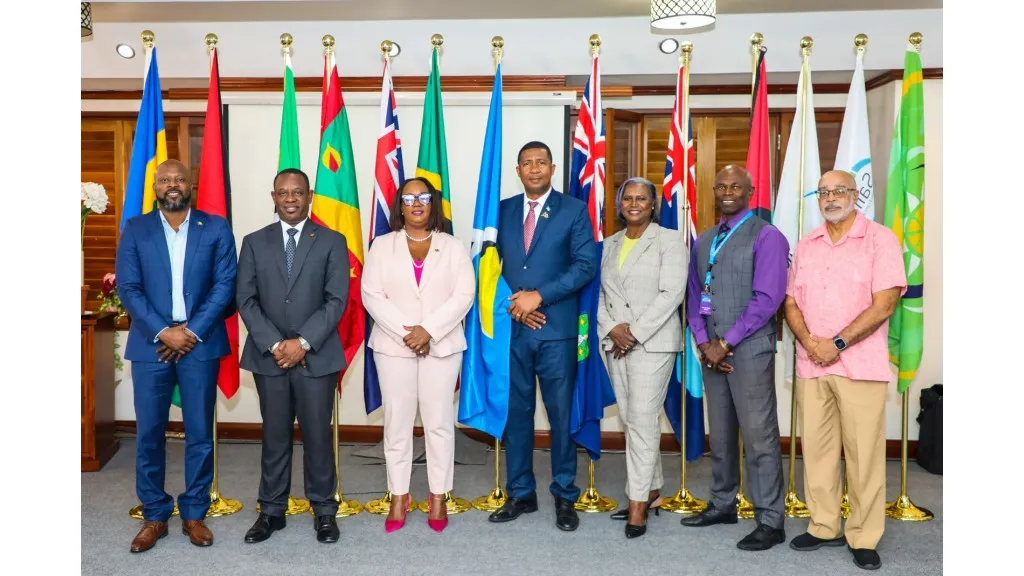Ministers of tourism from the Organisation of Eastern Caribbean States (OECS) have formally endorsed the OECS Sustainable Tourism Policy 2025–2035 at the Eighth Meeting of the OECS Council of Ministers: Tourism, held on Friday, March 28, 2025, at the Beachcombers Hotel in St Vincent and the Grenadines.
The new policy, which aligns with the OECS’s strategic priorities, is designed to drive economic transformation, promote environmental sustainability, foster social inclusion, and enhance resilience across Member States.
It introduces a renewed vision and mission, three broad strategic goals, twelve specific strategic goals, updated guiding principles, eight thematic development areas, and numerous common policy directives.
Grenada’s Minister of Tourism, Adrian Thomas, who chaired the meeting, emphasized that the policy represents more than just a set of guidelines.
“The Policy is not just a document,” he said, “It is a commitment to responsible governance, environmental stewardship, and economic resilience. By approving this policy, we are taking the bold step towards ensuring that our tourism sector strives sustainably, creating a lasting legacy for our people and our planet.”
Thomas expressed pride in the decision, adding, “Our responsibility is to set a clear and sustainable path. A path that balances economic prosperity with environmental conservation, cultural preservation, and social well-being. This meeting marks a pivotal moment in our collective effort to shape a sustainable future for tourism. One that ensures long-term benefits for our people, our environment, and future generations.”
Dr Didacus Jules, OECS Director General, highlighted the critical role tourism plays in supporting employment, livelihoods, and showcasing the region’s beauty and culture.
He noted the complex challenges facing the sector in 2025, including climate change, geopolitical instability, technological disruption, and shifting traveler preferences.
“The Caribbean tourism sector in 2025 is navigating a landscape marked by complexity and uncertainty. Several forces—climate change, geopolitical instability, technological disruption, and evolving traveller preferences—are reshaping our environment. These forces not only require bold leadership, but also a united commitment to reimagine the future of tourism in our region,” Dr Jules said.
He also addressed the challenges and opportunities presented by the rise of mega cruise ships, calling them a “double-edged sword.”
“We must strike a delicate balance between sustainability and expansion. This means implementing policies that encourage cruise operators to adopt greener practices and investing in port infrastructure that minimizes environmental harm,” Dr Jules explained.
The OECS Sustainable Tourism Policy 2025–2035 was developed through an extensive consultative process with Member States and replaces the 2011 Common Tourism Policy, which expired in 2016.
The policy will serve as the framework for building a more sustainable, resilient tourism industry across the region.
In addition to the policy endorsement, the Council of Ministers received a presentation on the potential impact of the USA’s new trade, economic, and immigration policies on the OECS and their implications for the tourism sector.
Updates were also provided on the OECS’s progress regarding the Climate Action Plan for Tourism, Niche Tourism Marketing, and Blue Tourism activities.
The meeting was attended in person by Ministers from Grenada, St Kitts and Nevis, St Lucia, St Vincent and the Grenadines, the British Virgin Islands, and Anguilla, with the Commonwealth of Dominica participating virtually.
Permanent Secretaries from Grenada and St Vincent and the Grenadines, along with other technical representatives from St Lucia, St Vincent and the Grenadines, and Martinique, were also in attendance.




